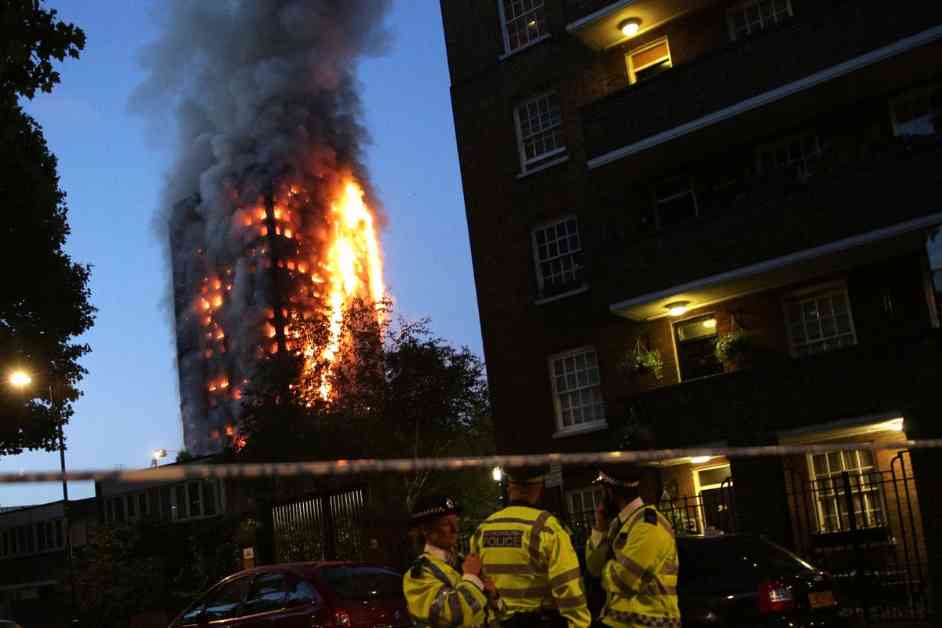Grenfell Survivors Share Their Stories
On the fateful night of June 14, 2017, Emma Louise O’Connor and her partner Luke found themselves caught in the midst of a tragedy that would change their lives forever. As they settled in for the night on the 20th floor of their Grenfell flat, little did they know that a fire would soon break out in the floors below them. The sound of the fire alarm jolted them awake in the early hours, prompting them to make a harrowing escape from the building.
For Emma, who has mobility issues, navigating the smoke-filled environment and making it down to the ground floor in a lift was a terrifying experience. She recalls the shock and disbelief she felt as she watched the flames engulf the tower block, claiming the lives of 72 individuals. “I went into shock,” Emma says. “I remember being dragged away from the scene by my partner who took me to my mum’s nearby. Looking at the building burning, I couldn’t actually believe what I was watching.”
The memories of that night continue to haunt Emma, as she grapples with post-traumatic stress disorder and survivor’s guilt. Her journey towards healing and seeking justice has been a challenging one, marked by a relentless pursuit for answers and accountability in the aftermath of the Grenfell tragedy.
Seeking Justice Through the Grenfell Inquiry
As the Grenfell Inquiry prepares to release its final report, survivors like Emma Louise O’Connor and Damel Carayol are hopeful that it will shed light on the factors that led to the catastrophic fire. The first phase of the inquiry, which focused on the events of the night and the response, left many survivors and activists dissatisfied with the lack of concrete action taken in response to its recommendations.
For Emma, justice means holding those responsible for the tragedy to account and implementing measures to prevent similar incidents in the future. She emphasizes the urgent need to remove flammable cladding from buildings across the country and restore funding to essential services like the fire brigade, which have been neglected in recent years.
Damel Carayol, who lost his cousin Khadija Saye and her mother Mary Mendy in the fire, echoes Emma’s sentiments about the need for accountability and justice. He believes that the inquiry should prioritize addressing the root causes of the fire and ensuring that those responsible are held accountable for their actions. As the community continues to mourn the loss of loved ones and grapple with the ongoing trauma of the Grenfell tragedy, the quest for justice remains a central focus for survivors and activists alike.
Lessons Learned: A Warning to the World
The Grenfell fire, which claimed the lives of 72 individuals, has served as a stark reminder of the systemic failures and inequalities that exist within society. Survivors, bereaved families, and experts have highlighted the intersection of race and class in the Grenfell tragedy, with a disproportionate number of victims coming from ethnic minority and low-income communities.
Damel Carayol emphasizes the importance of recognizing the warning signs that preceded the Grenfell fire and taking proactive measures to prevent similar disasters in the future. He believes that the neglect and indifference shown towards marginalized communities played a significant role in the tragedy, underscoring the need for greater accountability and transparency in how society addresses issues of disparity and neglect.
As the Grenfell community continues to advocate for justice and accountability, they hope that the lessons learned from the tragedy will prompt meaningful change in how society responds to the needs of its most vulnerable members. The ongoing struggle for justice and the quest for answers remain at the forefront of their efforts to ensure that the voices of those affected by the Grenfell fire are heard and their demands for accountability are met.
As the Grenfell survivors and activists continue to push for justice and accountability, their stories serve as a powerful reminder of the ongoing impacts of the tragedy and the urgent need for systemic change to prevent similar disasters in the future.












